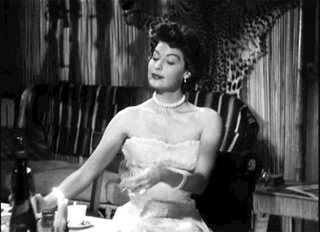The Wonky Donkey
A children’s book on Book Barmy?
Just watch this lovely Scottish lady reading the book to her grandson…
I’ll wait right here. Turn the sound up. And be sure to watch to the end.
Didn’t that just make you smile?
This video is all over the web right now. I decided to see if I could find a copy of this hysterical book for some favorite parents and grandparents.
Obviously, everyone else had the same idea — it’s out of stock and a few grubby folks with used copies are asking $500!
I imagine the publisher is furiously reprinting The Wonky Donkey as we speak. I’ll be buying multiple copies…
The Bookshop by Penelope Fitzgerald
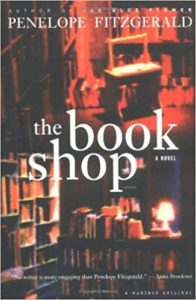 Another of my favorite books — The Bookshop has been made into a film.
Another of my favorite books — The Bookshop has been made into a film.
If you’ve not discovered Penelope Fitzgerald, well I’ll just say — you should. She was a Booker Prize English novelist, poet, essayist and biographer. And The Times included her in their list of the 50 greatest British writers.
The Bookshop is a human satire that plays out in a dreary, almost forgotten English seaside village, aptly named Hardborough. Florence Green opens her Old House Bookshop with some immediate success but is soon met with hostility from the town’s less prosperous shop owners. But the most vocal is Mrs. Gamart, the local arts patron who had wanted the bookshop space for her high-minded art center.
Florence is strong, yet kind — introspective but naive. Her dream of bringing literature to Hardborough is met with backbiting politics, and parochialism of a village resenting the intrusion of a relative newcomer.
To make matters worse, Florence discovers her bookshop comes with a leaky cellar, and even a ghost.
Florence does have some friends, the reclusive Mr. Brundish, and the precocious eleven-year-old Christine who comes to work in the bookshop. But the thing that puts everyone over the edge in this 1959 English village is her window display of the new and controversial novel Lolita
It’s a good book and therefore you should try to sell it… They won’t understand it, but that is all to the good. Understanding makes the mind lazy.
Ms. Fitzgerald gives the reader a subtle, yet razor sharp, view into the insularity of a small village and how petty people can be when faced with change.
Only too late does she begin to suspect the truth: a town that lacks a bookshop isn’t always a town that wants one.
I won’t sugar coat — this is not a feel-good bookstore novel. The Bookshop is an often harsh story and there’s not a bit of romanticism. And, sorry folks, there’s no happy ending, with everyone coming around to embrace the new bookshop. The ending leaves many unanswered questions which, if you’re like me, you’ll ponder long afterwards. I imagine just as the author wanted. To quote from the book itself:
[She] loved the moment when you finished a book and the story keeps playing like the most vivid dream in your head.
The Bookshop is a lovely, sly little novel in which a morality tale becomes both simultaneously humorous and tragic
And a final warning, Ms. Fitzgerald requires slow and attentive reading, all the better to appreciate the gorgeous writing and sly humor.
The film opened a couple of days ago and I’m looking forward to seeing it. The casting looks superb, I can only hope they don’t sprinkle it with too much saccharine.
Film trailer HERE
Exit West by Mohsin Hamid
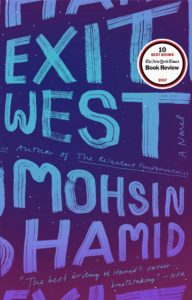 It’s taken me forever to write this review.
It’s taken me forever to write this review.
It took me forever to read the book.
This is one of those Very Important books. Nominated for a Manbooker Prize, high praise from NPR, and named one of The New York Times 10 best books. Exit West has been on many must read lists since it came out in 2017.
Timely — a love story set in a world descending into chaos over a massive influx of refugees. Okay I will read Exit West, this Very Important novel. And then, I thought, I’ll have something to talk about at parties (if I ever went to any).
As one reviewer said:
…both lyrical and urgent, this globalist novel evokes the dreams and disillusionment that follow Saeed and Nadia…peels away the dross of bigotry to expose the beauty of our common humanity.
The story centers on Saeed and Nadia who fall in love despite religious and societal differences in their unnamed country in the middle east, and as civil unrest builds in their country, they are forced to flee as refugees.
They secure escape through a series of magic doors that connect one country to another. Passage through the fictional doors is both risky and expensive — an obvious metaphor to the truth. The couple journeys to Greece, England, and eventually the United States through these doors, joining other immigrants along the way. As the borders are perforated by the magic doors, the refugees become their own humongous nationality regardless of national origin. There are serious impacts to both the new country and their personal lives.
See? Very Important book — Very Important topic
It’s a short book and should have taken only a few hours to read — yet, I kept putting it down.
I struggled to keep reading, struggled further to even finish it. And I’ve squandered an inordinate amount of time thinking about why I didn’t like Exit West.
It comes down to this ~~
This is just not a good book. Often poorly written, usually boring, and at times felt like I was reading an early draft. There are half page run-on sentences. The cool, detached narration meant I never warmed to the story, the characters, or their plight.
The concept of magical doors in a war torn country sweeping refugees to the peaceful west had such potential – but alas, it never really works. I never really believed in them. (Remember I read time travel books, so I can fall into magical realism.) The fictional doors remained a gimmick, not the metaphor both I, and I think the author, hoped for. It made me wonder why fictional doors? Isn’t the true refugee experience harrowing enough?
There are superfluous vignettes which introduce other poor souls but these are never re-introduced into the plot and were left unresolved.
The book ends without any sort of view into the future and had a post-apocalyptic feel about it.
After all the Very Important book hype, I anticipated a powerful novel that would not only sear into my heart, but also provide insight into the issue of immigration and the hard issues surrounding their resettlement.
I almost exited (!) the book several times, but I kept with it, so you won’t have to.
That’s just the kind of service we aim to provide here on Book Barmy. You can thank me later.
I’m off to find something to cheer me up.
I know, a nice cup of tea and the season 5 Great British Baking Show saved for marathon watching — and, perhaps this…
Dear Mrs. Bird by A. J. Pearce
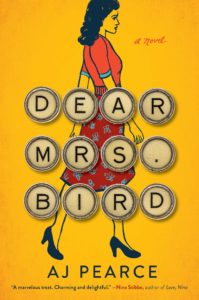 Coming out of my re-reading of The Guernsey Literary Potato Peel Pie Society, I remembered I had a copy of Dear Mrs. Bird which is touted as:
Coming out of my re-reading of The Guernsey Literary Potato Peel Pie Society, I remembered I had a copy of Dear Mrs. Bird which is touted as:
…a warm, funny, and enormously moving story for fans of The Guernsey Literary and Potato Peel Pie Society
Unable to return to present-day reading, I dove right into another novel based on a plucky young woman in war-torn London.
The novel opens with Emmy Lake, aged 23, riding the bus home from volunteering as a telephone operator with the Auxiliary Fire Services. She is carrying her handbag, gas mask, and a prized onion for stew. But, most importantly she has seen an advertisement for a position at the London Evening Chronicle. Emmy dreams of becoming a journalist, and with the war on, she imagines herself reporting from dangerous locations. With great excitement she applies for the job and gets the position, only to discover she’s actually working for the formidable Mrs. Bird who writes an advice column in the stodgy (and failing) Woman’s Friend magazine.
Emmy has to sort the incoming letters discarding any that are deemed as off limits. Mrs. Bird refuses to even read letters contain any mention of premarital, marital, and/or extramarital relations. No political or religious activities or opinions – no Hitler. Mrs. Bird ignores pleas from women who are troubled by Unacceptable Topics, which includes just about everything except questions about cooking or skin care. Everyone else needs to take Brisk Walks and have a Cheerful Attitude.
Emmy, can’t bear to see these heartbreaking letters so callously dismissed and decides to respond to a letter, then another, directly, without Mrs. Bird knowing. Okay, you’re thinking, I know how this is going to end, how quaint — it’s just a matter of time before Emmy will be found out. Is that it?
Never fear, the author has given us much more. Through the first person narrative, the reader is immediately drawn into Emmy’s world. The narrative alternates between her thoughts (almost like reading her journal) and her correspondence. Yes, she’s young, full of hope, excitement — with her emotions in capital letters — so much is Important or Exciting.
There is humor, with chapter titles such as A Quandary over Next Steps, or A Rumour of Pineapple Chunks
And then there are Emmy’s observations at once naive but also insightful:
My mother steadfastly referred to the war as This Silly Business, which made it sound like a mild fracas over a marmalade sponge.
Emmy and her friends are resilient and hard-working young people, making do with rationed food and altering hand-me-down clothing — they’re just trying to get on with their lives, their jobs, friendships, going to dances, and love complications ~~ all with the nightly backdrop of bombs falling on their beloved London.
Noise was coming from everywhere at once, as if we were being eaten by the very sound itself
Dear Mrs. Bird also deals with some serious issues. The plight of women left behind in widowhood or with lost lovers, trying to rebuild their lives. We see how post traumatic stress collides with the British stiff upper lip. The loss of lives, rationing, and the weight of constant fear. And there’s poor Emmy, in her volunteer fire service role, dispatching her male friends into bombed and burning buildings — with tragic results.
Emmy is the most fully characterized with her guileless faults and strengths (she reminded me of Jane Austen’s Emma) and we see a view of the London Blitz through the eyes of this young woman who wanted more out of life than society was willing to give her. Other characters could have been more fleshed out. Mrs. Bird was especially one-dimensional, I wanted to know her background and character a bit more.
But otherwise, this debut novel is just lovely — inspiring and intelligent and will have you alternately giggling and crying.
A digital review copy was kindly provided by Scribner via Netgalley
Ms. Pearce was inspired to write this novel after obtaining a women’s magazine from 1939. Interview with the author HERE
The Guernsey Literary & Potato Peel Pie Society
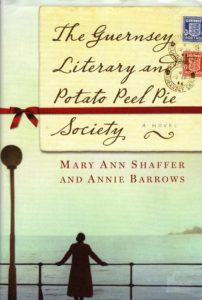 The Guernsey Literary & Potato Peel Pie Society
The Guernsey Literary & Potato Peel Pie Society
by Mary Ann Shaffer and Annie Barrows
There are beloved books I keep on my shelves just to re-read and The Guernsey Literary & Potato Peel Pie Society is just such a book. Netflix is releasing a film based on the book, so last night I reached for my copy to read — yet again.
This morning, I woke with the realization I’d never talked about this epistolary novel here on Book Barmy. By now, I’m sure you have already read this bestseller. But just in case, let me tell about about this this little gem just to tempt you into reading it (or re-reading) before the film debuts.
Mary Ann Shaffer spent years doing background research for The Guernsey Literary & Potato Peel Pie Society but sadly passed away just after the first draft manuscript went to the publishers. Her daughter, Annie Barrows, an author herself, completed the final editing.
Juliet Ashton, is a 32-year-old author and survivor of WWII London. She’s struggling to find a subject for her next book when she receives a letter from a stranger on isle of Guernsey which was occupied by the Germans during the war. Mr. Dawsey Adams tells that a used book by Charles Lamb called `Selected Essays of Elia’, kept him sane during the war. Turns out this tattered volume was once owned by Juliet and her address was written in the jacket cover. (Only in a book lovers world would this not be considered stalking.)
He goes on to tell her that the residents of Guernsey — namely the members of The Guernsey Literary and Potato Peel Pie Society — are starved for books and could Juliet help him find other books on Charles Lamb.
Thus begins this wonderful story and a correspondence which grows to include a number of characters who lived through the German occupation and were all, for the most part, members of the Guernsey Literary and Potato Peel Pie Society (I’ll let you discover the origins of the intriguing title). The society includes pig farmers to phrenologists (you learn more about Phrenology in your reading) — all literature lovers who outsmart the Germans. The letters are witty, poignant, and for this reader, eye-opening. Although it’s probably common knowledge to most (especially those in the UK), somehow I never knew Guernsey was occupied during the war.
Although the subject matter is serious — the Nazi occupation of Guernsey and the resulting cruelty inflicted on the residents of the beautiful island — (here’s where the author’s in-depth research shines*)— the manner in which the story is told endears the reader to each and every character.
So if you haven’t yet read The Guernsey Literary and Potato Peel Pie Society, get yourself a copy by hook or crook, because I agree with Juliet Ashton’s prediction:
There is some secret sort of homing instinct in books that brings them to their perfect readers.
The film starts airing on Netflix in early August. I’ll give it a try, but it looks like it might be a bit overly-romantic — trust me the book is much more — much richer. Film trailer HERE
*I gave a copy to a friend who was a child in Germany during WWII, and she said the bulk of the book rang true, however some of the German marching scenes were not technically correct — something about inappropriate goose-stepping.
At the Water’s Edge by Sara Gruen
 How do I decide which books to take on holiday? My requirements: They must be an easy read, yet intelligent enough to hold my interest when I’m sure to be reading in fits and starts. I read At the Water’s Edge while galloping across Central Europe and it fit the bill beautifully.
How do I decide which books to take on holiday? My requirements: They must be an easy read, yet intelligent enough to hold my interest when I’m sure to be reading in fits and starts. I read At the Water’s Edge while galloping across Central Europe and it fit the bill beautifully.
From the blurb:
After disgracing themselves at a high society New Year’s Eve party in Philadelphia in 1944, Madeline Hyde and her husband, Ellis, are cut off financially by his father, a former army colonel who is already ashamed of his son’s inability to serve in the war. When Ellis and his best friend, Hank, decide that the only way to regain the Colonel’s favor is to succeed where the Colonel very publicly failed—by hunting down the famous Loch Ness monster—Maddie reluctantly follows them across the Atlantic, leaving her sheltered world behind.
WWII is raging and yet this unlikely trio arranges passage across the Atlantic sailing through U-boats to a small Scottish village on the shores of Loch Ness. The only inn falls far below their usual standards, there is no electricity at night, there are severe food shortages, and rations on what little food is available.
Ellis and Hank are unwilling to adapt to the war-time conditions, expecting room cleaning, laundry service, and extravagant meals after their outings attempting to photograph the Loch Ness Monster.
Maddie, happily left behind during the men’s outings, starts to become friendly with the two young women who work in the inn and begins to see beyond her wealthy Philadelphia background. Maddie soon dons an apron and helps out around the inn, grows even fonder of her new friends — and especially the rugged Scotsman inn manager.
Meanwhile, our hapless American males grow even more obnoxious as they set out to interview locals who have reportedly seen “Nessie”. The villagers are having none of these monster seekers. They have no interest in helping out, so tell conflicting stories and give wildly inaccurate locations. As Ellis and Hank continue to fail in their quest, they drink excessively, stay out for days, and there are repercussions, not only to the marriage and their friendship– but throughout the village. Maddie grew on me, just as she did with the Scottish villagers. And the range of village characters were well drawn and unique.
This novel isn’t just about a Scottish village or searching for the Loch Ness Monster — there’s a hint of murder, a haunted castle, ghosts, a war story, superstitions, abuse and romance– and in the end — good versus evil.
I’ll admit there were some downright silly elements to the book. Normally I would roll my eyes but for some reason I was able to forgive them in this story. (See above — requirements for books when I travel.)
While the ending is a bit predictable, and sometimes the characters were either a bit all-too-good or all-bad, but this historical romance was a fun read with a beautiful setting and compelling story line.
Good vacation reading.



